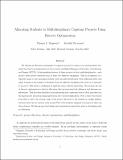Allocating Students to Multidisciplinary Capstone Projects Using Discrete Optimization
Author(s)
Magnanti, Thomas L; Natarajan, Karthik B
Downloadcapstone-final.pdf (503.5Kb)
OPEN_ACCESS_POLICY
Open Access Policy
Creative Commons Attribution-Noncommercial-Share Alike
Terms of use
Metadata
Show full item recordAbstract
We discuss an allocation mechanism of capstone projects to senior-year undergraduate students, which the recently established Singapore University of Technology and Design (SUTD) has implemented. A distinguishing feature of these projects is that they are multidisciplinary ; each project must involve students from at least two disciplines. This is an instance of a bipartite many-to-one matching problem with one-sided preferences and with additional lower and upper bounds on the number of students from the disciplines that must be matched to projects. This leads to challenges in applying many existing algorithms.We propose the use of discrete optimization to find an allocation that considers both efficiency and fairness. This provides flexibility in incorporating side constraints, which are often introduced in the final project allocation using inputs from the various stakeholders. Over a three-year period from 2015 to 2017, the average rank of the project allocated to the student is roughly halfway between their top two choices, with around 78 percent of the students assigned to projects in their top-three choices. We discuss practical design and optimization issues that arise in developing such an allocation.
Date issued
2018-05Department
Sloan School of ManagementJournal
Interfaces
Publisher
Institute for Operations Research and the Management Sciences (INFORMS)
Citation
Magnanti, Thomas L. and Karthik Natarajan. “Allocating Students to Multidisciplinary Capstone Projects Using Discrete Optimization.” Interfaces 48, 3 (June 2018): 204–216 © 2018 INFORMS
Version: Original manuscript
ISSN
0092-2102
1526-551X